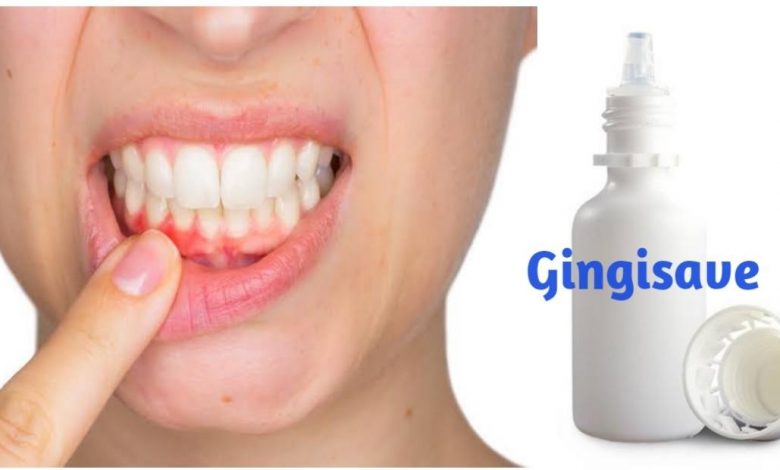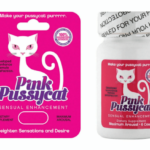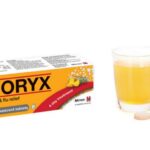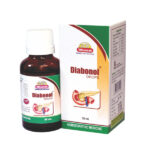Gingisave: Ingredients, Uses, Dosage, Side Effects

Gingisave Gum Astringent is a combination drug that is used in the treatment of gum and mouth inflammation. It blocks those chemical messengers that cause pain and inflammation from being released. By forming a protective layer, it also facilitates the healing of mouth ulcers.
Gingivitis is a common condition that affects most adults at some point in their life. It is a form of gum disease that typically causes mild symptoms. However, it can progress into a more severe condition if a person does not treat its root cause.
Besides this, Gingisave Gum Astringent 15 ml is used to treat mouth ulcers, pyorrhoea (a severe gum infection that destroys jawbone and loosens teeth), gingivitis (gum inflammation), or vincent’s disease (dirty grey ulceration of the mucus membranes).
What are the ingredients in Gingisave Gum Astringent?
Gingisave Gum Astringent 15 ml is a combination of three drugs, namely: Tannic acid (astringent), Zinc chloride (hemostatic agent and astringent), and Cetrimide (antiseptic). Tannic acid is an astringent and protein that helps to contract skin cells, thereby healing and relieving irritation due to mouth ulcers. Zinc chloride is a hemostatic agent with astringent properties that prevents bleeding and toughens the skin. Cetrimide belongs to the antibacterial that works by preventing microbial growth (bacteria) that could infect broken skin in the mouth.
How to use
Use the dosage and length of this drug as prescribed by your physician. Before using it, read the prescription and the label for instructions. With a cotton swab, apply it. Do not swallow or rinse with water after application, or eat for 10 minutes.
Use Gingisave Gum Astringent 15 ml as prescribed by your doctor. Your doctor will advise you how often you take Gingisave Gum Astringent 15 ml based on your medical condition. Massage a sufficient amount of Gingisave Gum Astringent 15 ml over the affected area of the gums. Gingisave Gum Astringent 15 ml is for external (dental) use only.
In some cases, you may experience irritation at the site of the application. Most of these side effects of Gingisave Gum Astringent 15 ml do not require medical attention and gradually resolve over time. However, if the side effects persist or worsen, please consult your doctor.
If you are allergic to Gingisave Gum Astringent 15 ml or any other medicines, please tell your doctor. If you have asthma, blood clotting disorders, or digestive system problems (ulcers), inform your doctor before taking Gingisave Gum Astringent 15 ml. Gingisave Gum Astringent 15 ml is for external (dental) use only. Avoid contact with Gingisave Gum Astringent 15 ml with nose, ears, mouth or eyes. In case Gingisave Gum Astringent 15 ml comes in contact with these areas accidentally, rinse with water thoroughly. If you are pregnant or a nursing mother, please inform your doctor before taking Gingisave Gum Astringent 15 ml. Avoid using Gingisave Gum Astringent 15 ml in large amounts or use for a long time than prescribed as it does not give quick or better results but increases the risk of side effects.
Side Effects of Gingisave Gum Astringent
• Local irritation
• Nausea
• Stomach Upset
• Skin Rash
• Acute Toxicity
Drug Warnings
If you are allergic to zinc chloride, tannic acid, and cetrimide, let your doctor know about this. Avoid using Gingisave Gum Astringent 15 ml in case you have asthma, blood clotting disorders, or digestive system problems (ulcers). Gingisave Gum Astringent 15 ml is for external (dental) use only so do not swallow or ingest it. Avoid contact with Gingisave Gum Astringent 15 ml with nose, ears, mouth, or eyes. In case Gingisave Gum Astringent 15 ml comes in contact with these areas accidentally, rinse with water thoroughly. If you are pregnant or a nursing mother, please inform your doctor before taking Gingisave Gum Astringent 15 ml. Avoid using Gingisave Gum Astringent 15 ml in large amounts or use for a long time than prescribed as it does not give quick or better results but increases the risk of side effects.
Interactions
If you have asthma, blood clotting disorders, or digestive system problems (ulcers), inform your doctor before taking Gingisave Gum Astringent 15 ml.
Safety Advice
Alcohol: Interaction of Gingisave Gum Astringent 15 ml with alcohol is unknown. Please consult a doctor before consuming alcohol while using Gingisave Gum Astringent 15 ml.
Pregnancy: Please consult a doctor if you are pregnant or planning for pregnancy. Gingisave Gum Astringent 15 ml is given to pregnant women only if the doctor thinks the benefits outweigh the risks.
Breast Feeding: It is unknown whether Gingisave Gum Astringent 15 ml is excreted in human milk. Therefore, it is given to breastfeeding mothers only if the doctor thinks the benefits are greater than the risks.
Driving: Gingisave Gum Astringent 15 ml usually does not affect your ability to drive or operate machinery.
Liver: If you have any concerns regarding the use of Gingisave Gum Astringent 15 ml in patients with liver problems, please consult a doctor.
Kidney: If you have any concerns regarding the use of Gingisave Gum Astringent 15 ml in patients with kidney problems, please consult a doctor.
Storage
Store in a cool and dry place away from sunlight





